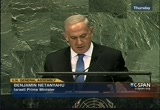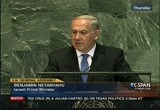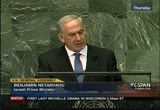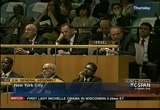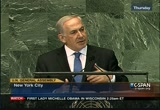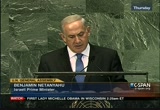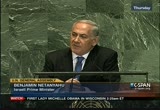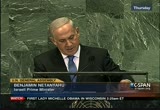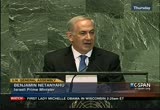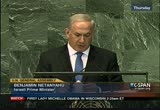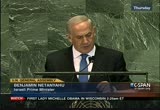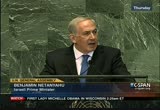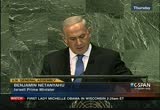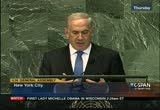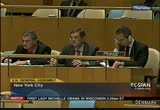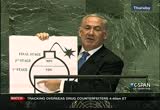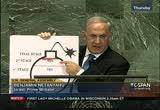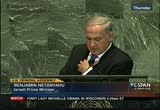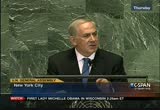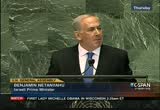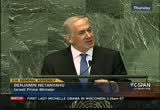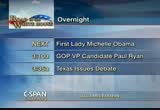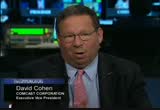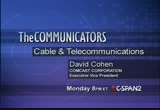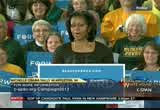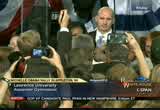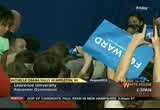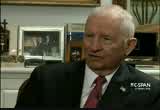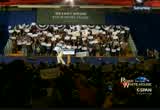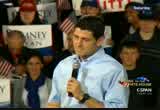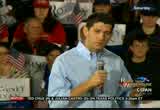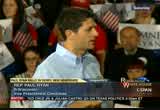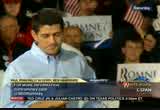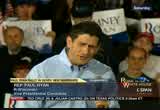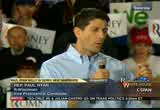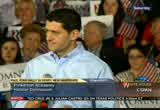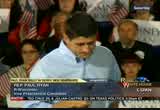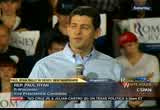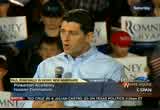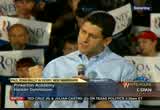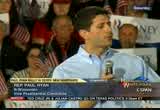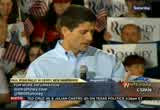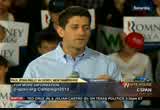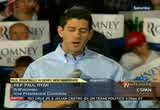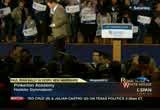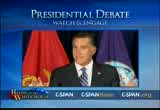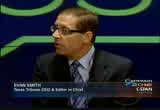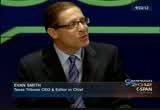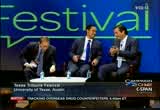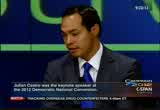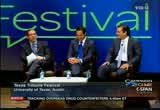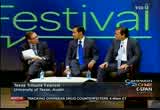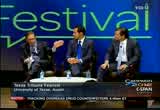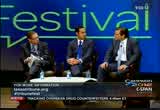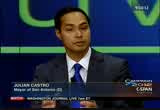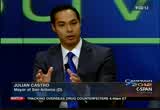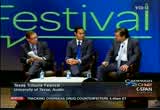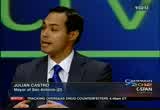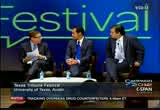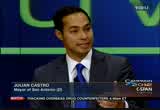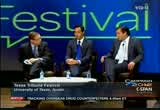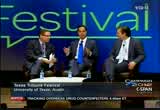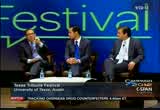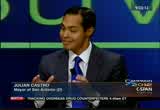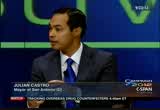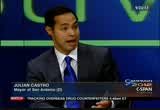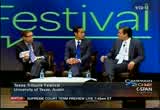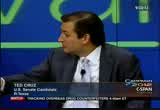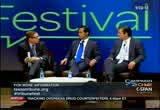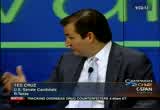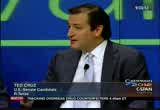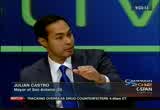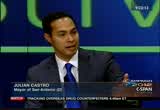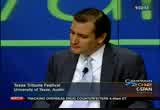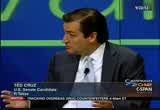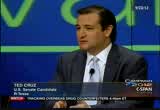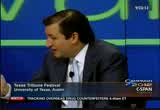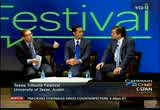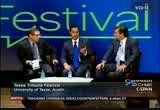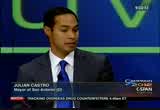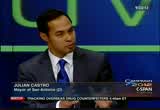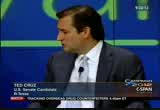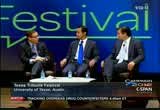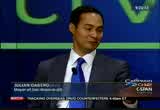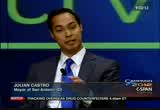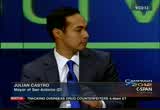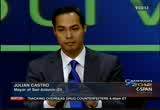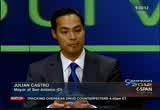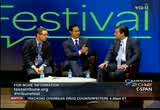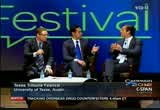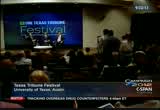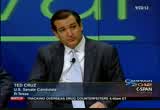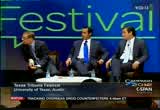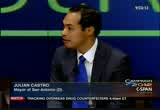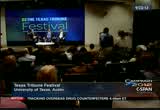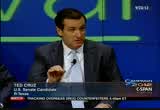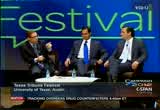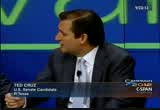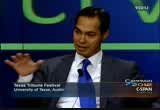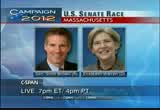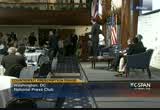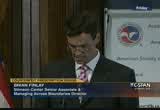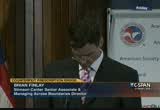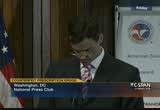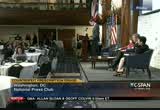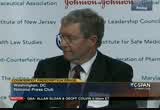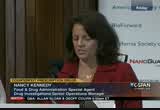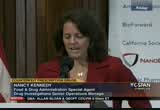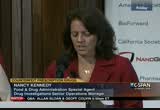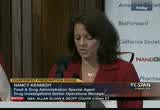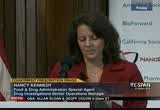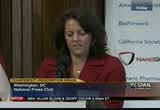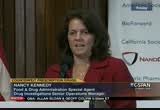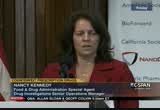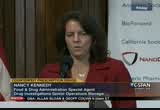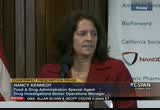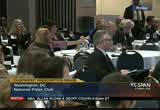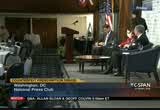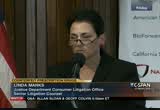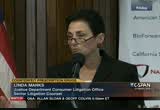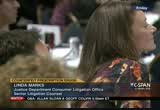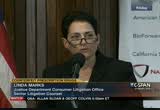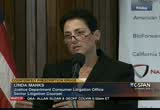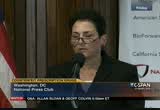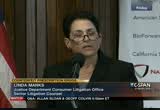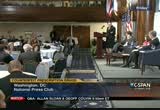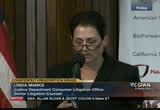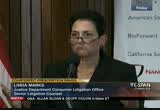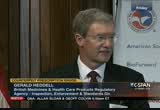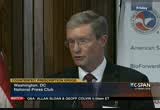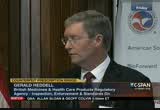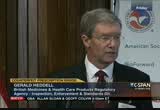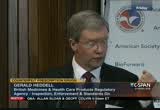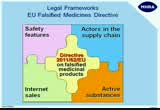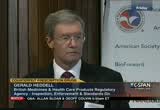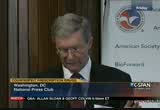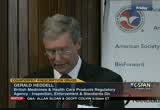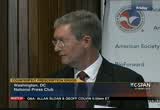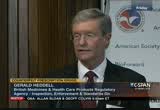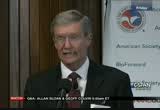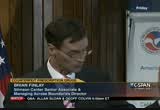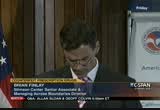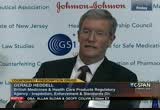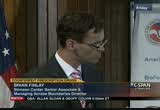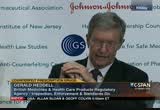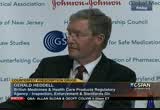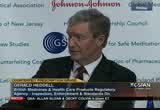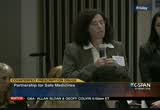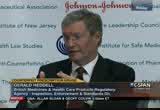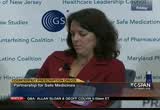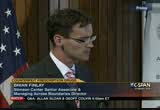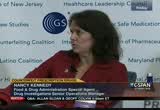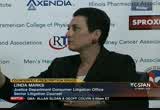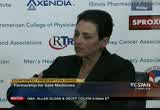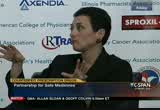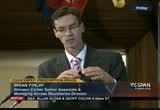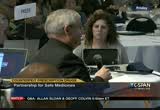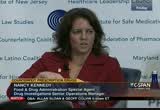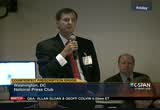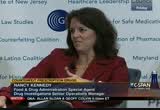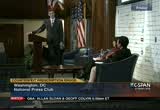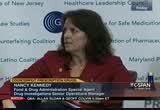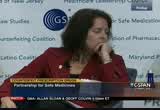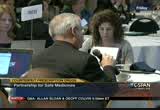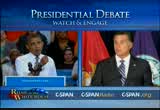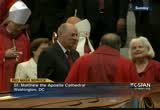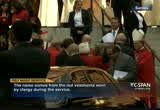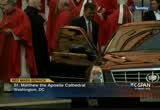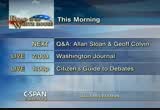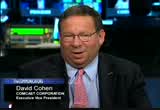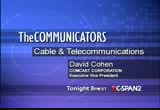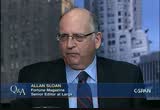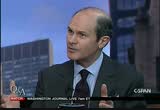tv News and Public Affairs CSPAN October 1, 2012 2:00am-6:00am EDT
2:00 am
. and yet the medieval forces of radical islam, who you just saw storming the american embassies throughout the middle east, they oppose this. they seek supremacy over all muslims. they are bent on world conquest. they want to destroy israel, they want to end the modern world. militant islam has many branches, from the rulers of iran with the revolutionary guards, to al qaeda terrorists and the radicalists lurking in every part of the globe. despite the differences, they are all rooted in the same bitter soil of intolerance. that intolerance is directed first to their fellow muslims and then to christians, jews, buddhists, hindus, and secular people.
2:01 am
i am sure of one thing -- ultimately, they will fail. light will penetrate the darkness. we have seen that happen before. some 500 years ago, the printing press helped pry europe out of the dark age. eventually ignorance gave way to enlightenment. so too with the middle east yield to the power of technology. when this happens, our region will be guided not by fanaticism and conspiracies, but by reason and curiosity.
2:02 am
i think the relevant question is this -- it is not whether this fanaticism will be defeated. it is, how many lives will be lost before it is defeated? we have seen that happen before, too. some 70 years ago, the world saw another fanatic ideology bent on world conquest. it went down in flames, but not before it took millions of people with it. those who oppose the fanaticism waited too long to react. in the end, the tyrant, but at a horrific cost. my friends, we cannot let that happen again. at stake is not nearly the future of my country, but the stake of the future of the world. nothing can imperil our common
2:03 am
future more than the army of iran with nuclear weapons. to understand what the world will be like with a nuclear- armed iran, imagine the world with a nuclear armed al qaeda. it makes little difference whether these lethal weapons are in the hands of the world's most dangerous terrorist regime or the world will the mark most dangerous organization. they are both driven by hatred and the lust for violence. look of what the iranian regime has done up to now. without nuclear weapons. in 2009, they brutally put down the protest in their country. there are thousands of syrians who are slaughtered, including children. they have better the killing in soldiers in iraq and continue to do so in afghanistan. before that, that killed hundreds of american troops in saudi arabia.
2:04 am
thousands of these rockets have been fired at israeli communities. in the last year, they have spread the international terror networks to two dozen countries across the continents india to bulgaria. they have even plotted to blow up a restaurant a few blocks from the white house in order to kill a diplomats.
2:05 am
of course, the iran rulers repeatedly denied the holocaust. they called for israel's destruction on a daily basis, as they did this week from the united nations. i asked you, given this record of an iranian aggression without nuclear weapons, imagine an iranian aggression with nuclear weapons. imagine their long-range missiles fit with nuclear
2:06 am
warheads. their terror networks armed with atomic bombs. who among you would feel safe in the middle east? who would be safe in europe? who would be safe in america? who would be safe anywhere? there are those who believe that a nuclear-armed iran can be deterred like a soviet union. that is a very dangerous assumption. militant jihadists behave very differently from secular marxists. they are no soviet suicide bombers. deterrents worked with the
2:07 am
soviets because every time the soviets faced a choice between the ideology and their survival, they chose their survival. the deterrent do not work with iranians once they get nuclear- weapons. there is a great scholar in the middle east professor lewis who put it like this -- for iran, mutually assured destruction is not a deterrent. it is an inducement. iran's apocalyptic leaders
2:08 am
believe that a holy man will reappear in the wake of a devastating holy war and ensuring that their brand of radical islam will rule the earth. that is not only what they believe, but what is guiding their policies and actions. he said, "the use of one nuclear bomb in israel would kill everything. it is not irrational to contemplate such an eventuality." that is coming from one of the so-called "moderates" of iran. shockingly, some people have
2:09 am
begun to peddle that absurd notion that a nuclear of iran would actually stabilize the middle east. yeah, right. that is like saying a nuclear armed al qaeda with our share in an era of universal peace. ladies and gentlemen, i have been speaking about the need to prevent iran from developing nuclear weapons for over 15 years. i spoke about it in my first term in office as prime minister. i spoke about it when i left office. i spoke about it when it was fashionable and i spoke about it when it was not fashionable. and speak about it now because the hour is getting a late, very late. i speak of it now because the iranian nuclear calendar does not take time out for anyone or for anything. i speak about it now because when it comes to the survival of my country, it is not only my right to speak, it is my duty to speak. [applause] i believe that this is the duty of every responsible leader who wants to preserve world peace.
2:10 am
for nearly a decade, the international community has tried to stop the iranian nuclear program with diplomacy. that has not worked. iran uses diplomatic negotiations as a means to buy time to advance its nuclear program. for over seven years, over seven years the international community has tried sanctions with iran. under the leadership of president obama and the international community, the united nations has put them under some of the strongest sanctions today. oil exports have been correct.
2:11 am
the iranian economy has been hit hard. it does have an effect on the economy. we must face the truth. sanctions have not stopped iran's nuclear program. according to the international atomic energy agency, during the last year alone, iran has doubled the number of energy uses in its underground nuclear facility. at this late hour, there is only one way to peacefully prevent iran from getting atomic bombs, and that is by placing a clear red line on iran's nuclear weapons program. [applause] red lines do not lead to war. they prevent war. look at nato's charter. it made clear that an attack on one member country would be considered an attack on all. red lines have helped keep the peace in europe for nearly half a century. and help preserve the peace for decades.
2:12 am
it is the failure to place red lines that has often invited aggression. if it were drawn in the 1930's, world war ii might have been avoided. the first gulf war might have been avoided. clear, red lines will also work with iran. earlier this year, they threatened to close the strait. the united states drew a clear, red line. iran backed off. different lines can be drawn in the i iranian nuclear program. but to be credible, a line must
2:13 am
be drawn first and foremost in one vital part of their program -- on their efforts to enrich uranium. let me explain why. any bomb consists of an explosive material and a mechanism to ignite it. the simplest example is gunpowder and a fuse. you light the fuse and set off the gunpowder. the gunpowder is enriched uranium. the fuse is a detonator.
2:14 am
for iran, amassing enough uranium is far more difficult than producing a nuclear fuse. for a country like iran, it takes many, many years to enrich uranium for a bomb. that requires thousands of center fuses spinning in tandem in big industrial plants. those are green plants are visible. they are still vulnerable. in contrast, iran could produce a detonator, the fuse, in a lot less time. maybe under a year. maybe only a few months. the detonator can be made in a small workshop the size of the classroom. it might be difficult to find and target that workshop, especially in iran. that is a country that is bigger than france, germany, italy, and britain combined. the same is true for the small
2:15 am
facility in which they can assemble a warhead or a nuclear device that could be placed in a container ship. chances are, you'll not find that facility either. the only way that you can credibly prevent iran from developing a nuclear weapon is to prevent iran from amassing enough enriched uranium for a bomb. how much enriched uranium do you need for a bomb? how close is iran to getting it? let me show you. i have a diagram for you. here is the diagram. this is a bomb. this is the fuse. in the case of iran's plan to build a nuclear bomb, this bomb
2:16 am
has to be filled with enough enriched uranium. iran has to go through three stages. the first page, they have to enrich enough uranium. second, they need to enrich enough medium uranium. the third and final stage, they have to enrich high uranium. iran has completed the first stage. it took them many years, but they have completed it. they are 70% of the way there. they are well into the second stage. by next spring, at most by the summer, they will have finished the medium enrichment and move on into the final stage.
2:17 am
they will have enough uranium for the first bomb. what i have told you is not based on secret information. it is not based on military intelligence. it is based on the public report of the international atomic energy agency. anyone can read them. they are online. if these are the facts, and they are, why should a red line be drawn? a red line should be drawn right here. before you run completes the second stage of nuclear enrichment necessary to make a bomb, before iran gets to a point where it is a few months or weeks away from amassing enough uranium to make a nuclear weapon. each day that point is getting
2:18 am
closer. and that is why i speak with such urgency. that is why everyone should have a sense of the urgency. there are some who claim that even if you run completes the iranian process, even if it crosses that red line, our intelligence agencies will know where and when iran will light the fuse. no one appreciates our intelligence agencies more than the prime minister of israel. all of these leading intelligence agencies are superb, including ours. they have foiled many attacks
2:19 am
and have saved many lives, but they are not foolproof. our intelligence agencies did not know that iran is building a huge uranium plant under a mountain for two years. ladies and gentlemen, the relevant question is not when iran will get the bomb. the relevant question is, at what stage, no longer stop iran from getting the bomb? the red line must be drawn on their enrichment uranium program. these facilities are the only
2:20 am
nuclear installations that we can definitely see and credibly target. faced with a red line, iran will back down. this will give us more time with diplomacy and sanctions to dismantle its nuclear program altogether. two days ago from this podium, president obama reiterated that the threat of nuclear arms iran cannot be contained. i very much appreciate his position, as does everyone in my country. we share the goal of stopping iran's nuclear weapons program. this will unite the people and
2:21 am
the leaders of the world. but i said today will help ensure that this common goal is achieved. israel is in discussions with the united states over this issue. i am confident that we can chart a path forward together. ladies and gentlemen, the clash between the modernity and medievalism is -- the jewish people have always looked toward the future. throughout history, we have been at the forefront of efforts
2:22 am
to expand liberty and promote equality and human rights. we have championed these principles. we treat all with dignity and compassion, pursue justice and cherish life, and pray and strive for peace. these are the jewish people's greatest gift to mankind. we commit ourselves to defend these values so that we can protect these freedoms and protect civilization. thank you. [applause] >> see the first of presidential debates wednesday night live on c-span, c-span radio, and c-span
2:23 am
.org.or tomorrow, how best to watch the upcoming presidential debates. the discussion is designed to offer a citizen's guide to watching an understanding the debate. it is live at 1:00 p.m. eastern on c-span. >> there is a lot of research out there that usage is even higher mobile among communities than it is among white communities. i have seen some pretty startling research in some of
2:24 am
these minority community spirit 70% use brought them for mobile applications. i am not a critic of mobile broadbent in any way whatsoever. after the riots -- the rise and wireless transaction, we are in business. my comment now is not a platform comment. it is more a device comment. if you are going to do mobil on a laptop and he will get real broadband speed, i do not have any problem whatsoever. if you go into the educational contexts and you're talking about mobile on its part farm, and a lot of this access to the broadbent for mobile devices and minority communities in particular, i do not view that as and the acceptable substitute for a laptop or desktop. >> comcast david cohen on the
2:25 am
2:26 am
[cheers] >> thank you so much! yes, i'm very excited to be with you all today. i want to start by thanking eli for that very kind introduction for everything he's doing for this campaign. i want to thank a couple of -- one more person as well. i want to recognize former senator russ feingold. [cheers] thank you for everything you've done for this state and everything that he's doing for the campaign here in wisconsin. and most of all, i want to thank all of you, especially all the students here at lawrence university. thanks for being here. yes! yes! now, you all seem pretty fired up and ready to go. [cheers] and that's great because i'm feeling pretty fired up and ready to go myself. yes indeed. you know, the wonderful thing about coming out into the country, coming and doing
2:27 am
rallies, speaking to you guys is that i get to do one of my favorite things -- i get to talk about the man i have loved and admired for -- since 23 years ago. i've been sharing a little of our business, all right? just a little. but back when we first met, barack had everything going for him, all right? ladies, listen -- he was handsome. still is. dd don't you think? he was charming, talented and oh, so very, very smart. but that is not why i married him. so fellows, listen to this. what truly made me fall in love with barack was his character. did you hear what i said, gentlemen? it was his character, his honesty, his decency, his compassion. it was his conviction.
2:28 am
i loved that barack was so committed to serving others that he turned down high-paying jobs and instead started his careers fighting to get folks back to work who struggled in communities. i loved that about him. i also loved that barack was so devoted to his family, especially the women in his life. i watched this. i saw the respect that he had for his own mother, how proud he was that she was able to put herself through school and still support him and his sister as a single mom. i saw the tenderness he felt for his grandmother and how grateful he was that long after
2:29 am
she should have retired, she was still waking up every morning, catching that bus to the job at the community bank, and he watched as she was passed over for promotion simply because she was a woman. but he also saw how she kept on doing that same job. kept getting up year after year, without complaints and without regret. and with barack i found a real connection because in his life story, i saw so much of my own. growing up on the south side of chicago, i watched my own father make that same uncomplaining journey every day to his job at the city water plant. i saw how he carried himself with that same dignity, you know? that same pride in being able to provide for us.
2:30 am
that same hope that his kids would one day have opportunities he never dreamed of. now, how many people do we know like that in our lives? you know? [applause] like so many families in this country, our families weren't asking for much. they didn't want much. they didn't begrudge anyone else's success. they didn't mind nb others had much more than they had. in fact, they admired it. they believed that in that fundamental american promise that even if you don't start out with much, if you work hard and do what you're supposed to do you should be able to build a decent life for yourself and an even better life for your kids and grandkids, and -- [applause] absolutely. and our families believed that when you work hard and you've done well and you finally walk through that doorway of opportunity, you don't slam it
2:31 am
shut behind you. you reach back and you give other folks the same chances that helped you succeed. [cheers] that's how barack, that's how so many of us were raised. those are the values were you we were taught growing up. we learned that how hard you work matters more than how much you make, right? we learned that the truth matters so you don't take shortcuts, you don't game the system, you don't play by your own set of rules. we also learn that would none of us gets where we are on our own. that each of us -- [applause] every single one of us has a community of people lifting us up. from the teachers who inspire us to the janitors who keep our schools clean. [applause] and what our parents and
2:32 am
grandparents taught us is that you value everyone's contribution, you treat everyone with respect. we also learned about citizenship and service, you know, that we're all a part of something bigger than ourselves, that with our freedoms come obligations and with our blessings come a duty to give back to others with less. and these are the values truly that make barack such an extraordinary husband to me and a phenomenal father to our girls. [applause] i will tell sasha and malia you say hi. talks very sweet but i about barack's values not just as a wife and a mother but also as a first lady who has seen up close and personal what being
2:33 am
president really looks like and just how critical those values are to leading this country. you know, over the past three and a half years i've seen how the issues that come across the president's desk are always the hard ones. the decisions that are not just about the bottom line but about lying a foundation for the next generation. i've seen how important -- [applause] yes. and i've seen how important it is to have a president who doesn't just tell us what we want to hear but he tells us the truth, even when it's hard. especially when it's hard. [applause] and i've also seen that when it comes time to make those tough
2:34 am
calls -- and everyone is urging you to do what's easy. everyone is urging you to do what polls best, what gets good headlines. as president you have got to be driven by the struggles, hopes, and dreams of all of the people that you serve. as president you have to have a strong inner compass, a core commitment to your fellow citizens and that's how you make the right decisions for this country. that's what it takes to be a leader. [applause] and let me just say, since the day he took office, you know, on issue after issue, crisis after crisis, that's what we've seen in my husband. we've seen his values at work, the vision of his character and
2:35 am
critics. think back to when barack first took office. right after he was inaugurated. our economy was on the brink of clams. newspapers were using words like meltdown, calamity. create implodes, economy in crisis. for years folks had been lured into buying homes they couldn't afford so their mortgages were under water, banks weren't lending, companies weren't hiring, the auto industry was in crisis. this economy was losing 800,000 jobs every month. 800,000 jobs every month. and a lot of folks whether we were headed for a great
2:36 am
depression. see, now that's what barack faced on day one as president of the quiet. but instead of pointing fingers and placing blame, your president got to work. [applause] he was thinking about us. about folks like my dad and like his grandmother and that's why he cracked down on lending abuses so today when folks apply for a mortgage or credit card you know exactly what you're getting in to. that's why he cut taxing for families and small businesses. balls we believe that teachers
2:37 am
and firefighters should not be paying higher tax rates than millionaires and billionaires, not in america. [applause] he got the all the industry back on its feet and today new cars are rolling off the line at proud american companies like g.m. and yes, while we still have a long way to go to rebuild our economy, understand we have had 30 straight months of private sector job growth, a total of 5.1 million new jobs under this president! good jobs. right here in the united states of america.
2:38 am
[applause] let's talk about the health of our families. see, barack didn't care whether health reform was the easy thing to do politically. that's not who he is. he cared that it was the right thing to do, and thankfully because he fought for health reform, today our parents and grandparents on medicare are paying hundreds less for their prescription drugs. our young people can stay on their parents' insurance until they're 26 years old. [applause] insurance companies now have to cover basic preventative care. things like contraception, cancer screening. they won't be able to discriminate against you because you have a preexisting condition like diabetes or asthma, and if you get a serious illness -- let's say breast cancer -- and you need expensive treatment. they can no longer tell you sorry, you hit your lifetime limit and we're not covering a
2:39 am
penny more. that is illegal because of health reform. and as eli mentioned, when it comes to giving our young people the education they deserve -- see, barack knows that like me and like so many of you he never, never couch attended college without financial aid. never. in fact, as i shared in my speech in charlotte, when we were first married, our combined student loan bills were higher than our mortgage. when it comes to student debt, barack and i, we've been there. this is not a hypothetical. that's why barack fought so hard to double funding for pell grants and keep interest rates down. [applause] because he knows how important it is for all of our young people to be trained to have the skills that you need for the jobs of the future. you know, good jobs you can
2:40 am
raise a family on. jobs that will drive our economy for decades to come. and finally, when it comes to understanding the lives of women -- you know, what it comes to standing up for our rights and opportunities, we know that my husband will always have our backs. always! see, because barack knows from personal experience what it means for family when women aren't treated fairly in the workplace. he knows what it means when women struggle to meet the demands of their jobs and the needs of their families. and today, believe me, he knows as a father, he knows what it means for our daughters to have the same freedoms and opportunities as our sons. that's why the first bill he signed into law as president was to help women get equal pay
2:41 am
and are equal work. [applause] yes, and that is why he will always, always fight to insure that -- ensure that women, that we can make our own decisions about our bodies and our health care. [applause] so when people ask you what this president has done for our country, when you're talking to folks who are deciding who's going to keep our country moving forward for four more years, here's what i want you to tell them. just a few things -- becse we don't have all day. i want you to tell them about the millions of jobs barack create. tell them about how he passed health reform, tell them about all our kids who will finally be able to afford college. tell them how barack ended the war in iraq. [applause]
2:42 am
tell them how together we took out osama bin laden. tell them how barack fought to get veterans and military families the benefits they've earned. tell them about young immigrants brought to america through no fault of their own and how they will no longer be deported from the only country they've ever called home. [applause] tell them how our brave men and women in uniform will never, never again have to lie an who they are to serve the country they love. [applause] you know this. you know i could go on and on and on but here is what i want you to tell them. tell them that barack knows the american dream because he's lived it.
2:43 am
he has lived it. and he has been fighting every day so that every one of us in this country can have that same opportunity no matter who we are or where we're from or what we look like or who we love. but let's be clear. while my husband is proud of what we have achieved together, he is nowhere near satisfied. not at all, not for one second. barack knows that too many people are still hurting. he knows that there's plenty of work left to be done. as president clinton said in charlotte, it is going to take a lot longer than four years to rebuild an economy from the edge of collapse. but here's one thing that i know for sure -- our president has been fighting for us. he has been struggling with us and together, slowly but surely, we've been pulling ourselves out of that hole we started in. for three and a half years we've been moving forward, we've been making progress and we're
2:44 am
beginning to see that change we all can believe in. we have to ask ourselves, are we going to turn around and go back to the same policies that got us into that hole in the first place? are we going to sit back and watch everything that we worked for and fought for to slim away? are we going to keep moving this country guard? what are we going to do? forward! we have to keep moving forward. yeah! audience: four more years! four more years! >> but here's the thing. the answer to these questions is on us. it's up to us. because all of our hard work, all the progress we've made together, it's all on the line. everything is at stake this november, and as my husband has said, the only guarantee is that this election will be closer than the last one and it could all come down to just a
2:45 am
few battleground states like wisconsin. can decide the whole thing by just a few thousand votes. and while that may sound like a lot, a few thousand votes -- remember that those votes are spread out across an entire state. across hundreds of cities and thousands of wards. when you think about it like that, just a handful of votes in every ward could make all the difference in the world.
2:46 am
that could mean just a couple of votes in a neighborhood. just a single vote in an apartment building or in a dorm room. so understand, especially for our students, that one neighbor that one classmate you get to the polls on november 6, that one voter you persuade that one new volunteer you recruit, that could be the one that puts us over the top, so with just a few evenings on a phone bank, with just a few hours knocking on some doors, everybody in this room has a chance to swing an entire ward for barack obama. if we win enough wards we will win this state. and if we win this state we'll be well on our way to putting barack obama back in the white
2:47 am
house for four more years. with your help. with your help. so here's what i need to you do -- here's the plan. the secret plan. you guys turn off your cameras. just kidding. so from now until november we're going to need every single one -- look at this room. look at the power in this room. we're going to need every single one of you to work like you've never worked before. young people, like so many of you here. you all have driven barack's campaigns with your passion and your energy. gosh, you guys are good. and 39 days is a long, long time in any campaign, don't be fooled. this got to turn all of energy and excitement into
2:48 am
action. doesn't't count if it go into action. we have to work right up until the very end. so we need you to find one of our volunteers today. they're around here. they have clipboards. we need you to sign up with them to make calls, knock on doors, to help get the vote out on campus and in the community and we also need you to talk to everyone you know. your friend, your neighbors, that cousin you haven't seen in a while that student sitting next to you in class who you know is not registered. [laughter] you know it, and for our students, especially, talk to your parents and grandparents. i can't tell you how many grandparents came up to me and told me that the only reason they voted for barack obama in 2008 was because of what it meant for their grandchildren. so what you say matters more
2:49 am
than you know. so talk to them. tell them what's at stake in this election. remind them of all of the wonderful things this president has accomplished. bring them to events like this one if you can, but most of all, make sure that the folks you talk to and yourselves, make sure that you're registered to vote. especially for students, if you've just moved, you have to re-register. if you've never voted before, you can't vote until you register. so the first step is getting registered. make sure that you know that here in wisconsin you can vote early. you can start voting as early as october 22 at any municipal post office, right? you students, all right? you all in particular. you need to vote early. you know what's going to happen on election day, right? you're going to oversleep or be like -- was that election day? that was yesterday?
2:50 am
[laughter] so we need you to vote early because you have weeks to do it. you can do it in between classes, you can do it on a weekend. you don't have to wait for that one day. for the folks that you talk to, tell them that they can register and vote on the same day, whether you're voting early or on election day, ok? but don't pro contrast nate, as i tell my children. don't wait. and if folks don't know where to go for the information they need, send them to ownyourvotewi.com. there they can find everything they need to make their voices heard. all the information is on this website. make sure you send people there if you don't know offhand. we got it? secret plan? ok, you may turn your cameras back on.
2:51 am
[laughter] but i want to be honest with you. this journey is going to be hard, ok? and these next days are going to feel long, all right? and here's the thing. there will be plenty of ups and downs along the way, all right? that's how it works in a campaign. but when you start to get tired and you will -- when you start to think about taking a day off, and you will -- i just want to you remember that what we do for the next 39 days will absolutely make the difference between waking up the day after election day and wondering could i have done more or feeling the promise of four more years. it's the difference in how we work. so from now until november 6, we need you to keep on working and struggling and pushing forward because here's the thing, especially for our young people. that is how change always happens in this country.
2:52 am
real change takes time. it requires patience and tenacity and that's not just with politics. it's with everything that happens in life. it takes time, right? but if we keep showing up, if we keep fighting the good fight, if we keep doing what we know is right, then eventually we get there. this is what i want you all to know. in america we always move forward. we always move forward. [applause] maybe not in our lifetime but maybe in our children's lifetimes. maybe in our grandchildren's lifetimes because in the end that's what this is about. alwayswhat elections are about. don't let anybody tell you
2:53 am
differently ever. elections are always about hope. the hope that i saw on my father's beaming face as i crossed the stage to get my college diploma. the hope that i'm sure barack's grandmother felt as she cast her ballot for the grandson she loved and raised. the hope that all those men and women in our lives who worked that extra shift for us, who saved and sacrificed and prayed so that we could have something more, the hope that so many of us feel when we look into your eyes, the eyes of our children and our grandchildren. that's why we're here. that's why i'm here. because we want to give all of our children a foundation for their dreams, all of them. we want to give all of our children opportunities worthy of their dreams because what we all know for sure -- i don't care what party you're from, all of our kids are worthy, every
2:54 am
last one of them. [applause] we want to give our kids that sense of limitless possibilities. that bleach that here in america, the greatest country on the planet, there is always something better out there if you're willing to work for it. so what i tell myself is we cannot turn back now, not now. we have come so far. but we have so much more work to do, don't we? so are we ready to do this? are you all ready to roll up your sleeves? are you fired up? are you ready to go? are you ready to work? let's get it done. thank you, guys. god bless. [applause] [captions copyright national cable satellite corp. 2012] call[captions copyright national cable satellite corp. 2012]
3:36 am
3:37 am
please give our sponsors a hand. [applause] we will visit for about 40 minutes. when we get started, there are phones on either i'll. we ask that of that the microphone at the appropriate -- we ask that you line up at the microphone at the program time than july 31, 2012 began with the announcement that julian caster would be the keynote speaker at the democratic national convention. the footsteps of several. before mayor castro had uttered the words menudo " gulf,
3:38 am
speculation began. -- menudo cookoff, speculation began. july 31 was a port from which the future of texas and possibly the nation was visible. mayor castro and mr. crews are young and intelligent lawyers who can give a punch and take a punch and give a stunning view of the world with all of its opportunities and all of its challenges. there also is vanity and a state that is in the epicent of the demographic change recrimination.
3:39 am
mayor captured just turned 38 pin he is a gradue of stanford university and harvard law school. he is a national co-chair of the obama-biden reelection campaign. mr. cruz is 41. he is a graduate of princeton university and harvard law previous work with chief justice william rehnquist, advised the bush-cheney campaign in 2000, work with the federal trade commission and the department of justice before serving as the nation's youngest solicitor general. but to have them both re today.
3:40 am
[applause] the gentleman, thank you so much for being here. you both had quite a summer. mayor castor, let me ask you to reflect on this summer. -- mayor castro, let me ask you to reflect on this summer. >> first, a greenwich solutions for of and for a wonderful event. -- first, congratulation for evident for a wonderful event -- for evan for a wonderful event. it was like throwing a claustrophobic into a closet and then taking away the key. [laughter]
3:41 am
i think what we have seen in historical cycle of some of what we saw in 2010 -- in this 2012 cycle is in some of what we saw in 2010. people are still committed to the fundamental ideals that make the nine states special, that make it a land of opportunity, that make it a believe the greatest country in the world. in the same time gun they are nervous. -- at the same time, they are nervous. it has been an exciting summer appeared i also learned that my daughter knows have to flip her hair. [laughter] >> she does. most famous child in america. the nation also learn you have a twin brother. they said that the democrats
3:42 am
love julien castro so much, they have an extra one. [laughter] mr. cruz, where did you learn about yourself and what did you learn about the state of politics in this country? >> at the convention, i was just glad that i did not fall off stage. when i came out, the plan had been there would be a two-minute video. as happens at these conventions, they were running a bit late. they said okay, we will cancel the video. you had right on down and instead of just a clean stage, you had a podium and the teleprompter going down and there was literally aboua 15-fot tent gng down behind me. >> were you surprised at the
3:43 am
convention about anything you her saw? you have been pretty clear about your own views. but what did you hear? >> i thought the convention was fantastic. but the there was an energy on the ground. in terms of what i have learned and experienced in the last year-and-a-half, it truly has been -- the biggest thing in terms of our primary is that it was really a testament to the grassroots. in any other cycle, what happened in the republican primary could not have happened. in any ordinary year, the should have been a very easy lay down. we were out-spent three-one. when we started, i was a 2%. >> the primaries back in march. you may not be sitting here. >> thank god for small mirles. >> youublished an opinion piece in "the wall street *"
3:44 am
this week where you say that america is that a crisis point. can you explain that to? >> i think we are at a fiscal and economic cliff. i think we have pursued government spending programs that have created a debt that is out of control. at the convention come after talking, i went home to my hotel at 1:30 a.m. and i was looking on my iphone at twitter. and the comedian paa pound stone had sent a tweet that evening. i don't know her, but she said " ted cruz just said that, when his daughter was born, the debt was $5 trillion and now it is $16 trillion. what the heck did she do?" [laughter] >> you think the debt is putting the nation in crisis. >> along with government
3:45 am
spending, is causing the dead. we have seen a growing expansion in the power of the federal government. it is crippling small businesses. >> you are the national co-chair of the obama-bided campaign. >> i would put the challenge that we have as a nation in a different context. and say that, to the extent that we are a nation in "crisis," although i would not describe it as that because i believe that we can fundamentally overcome this and that we can do it in a fairly rational and reasonable way, i think the challenges that we have now had more than a generation of folks who are not willing to ask americans to sacrifice and to be realistic about how we take on our biggest
3:46 am
challenges. for instance, everyone remembers the republican debate where they asked whether you would take the bargain of one dollar's worth of tax increases or $10 worth of basically tax cuts and everybody raised their hands and said they would not accept that. we have become a country where -- it is not just one side, both sides, but more one side now than ever is not willing to be realistic about how we can tackle these challenges. if there is a crisis that i see in the united states for the long term, it is not the temporal issue of how we will deal with money. beuse i am very confident we will be able to deal with that. it is how will we bring that -- bring back our sense of what we can accomplish together as
3:47 am
americans when we are realistic about those challenges. that is the thing i think about the word "crisis" in this country. >> mayor castro is not the first to suggest that. for 10 years now, we heard that the government is not asking all of us to do enough. >> it is interesting. the word "sacrifice," when i hear a politician say that, it usually means grab your wallet. it usually means increasing taxes. and i will give president obama credit to in his the first presidential candidate since walter mondale to run explicitly on a platform that he will raise taxes. >> he is saying he will raise taxes on the wealthy. >> according to the supreme
3:48 am
court, he already has raised taxes. that was the basis on which the supreme court of held obamacare, that it was a tax increase. >> to mayor castro's point, people who have more are being asked to sacrifice. you do not agree with that. >> i do not agree with that. but me say two things. if you look historically, such spending has been 20% of gdp. federal spending has been 18% of gdp. i think the problem is we're spending too much. in the last three years, federal spending has gone from 20% of gdp to 25% of gdp. that is a fundamental structural shift and it is produced -- it has produced record-setting
3:49 am
deficits and putting us in a path of greece and where much of europe are. the economy is teetering on the edge of recession. the were seen can do is jacked up taxes on small businesses and entrepreneurs or job creors. that makes it all the more likely to push us into a recession. and for the 23 million people who struggling for work, the worst thing to do is hurt the small businesses that create those jobs. >> it is fair to say that the president has reduced taxes. he has reduced taxes for small businesses 18 times. he cut taxes for '95 -- for 95% of families out there. the question is do we ask everyby to sacrifice? when you look at the marginal rate in the united states, when ronald reagan took office, the marginal office with 71% to 72%. it is interesting to me that the greatness that people speak of
3:50 am
in terms of the united stas, when we talk about the 1940's, the 1950's, the 1960's, 1970's, the marginal rate that folks paid was much greater. nobody says we will go back to that. at the same time, during the clinton years, we had marginal rates that were a little bit higher than they are now and we had some of the best economic times that the country has ever seen. that is what i'm talking about. my concern for the country is thatll of this heat has been generated around this issue instead of light and analysis and a sober look at the role that every american play, should play in strengthening our country. that is the concern i have in the long run. >> i want to pick up mr. cruz's suggestion that the economy is in trouble from -- is in trouble. texas has endured.
3:51 am
but san antonio has had a tough couple of years. the census bureau report brought these numbers appeared between 2009 and 2011, unemployment in san antonio went up by more than a full point. needed household income has gone down. you know how tough the economy is. you're leaving a city that has been bearing some of the brunt. can you talk about that? few dispute that the economy is in a world of hurt? whoever's responsibility that is. >> i think every american would say that the economy is not where we wanted to be. but if you look nationally, there is no question that we have had 30 months of private- sector job growth. 4.6 million new jobs that were created during that time. at the same time, if we were to go right now to the archives of the university and pull out the front page headlines from four
3:52 am
years ago and look at what was happening at this 0.4 years ago, where we were losing hundreds of thousands of jobs. in the month when president obama took office, we lost almost 800,000 jobs that month. there was talk of ather depression at that time. whether we are talking about taxes or san antonio or anyplace, are we were we want to be? no. but are we better off than where we were? when we're talking about going into ather depression and the banks collapsing and so on and so on? absolutely. there is no question in my mind. >> this question has become a part of his campaign. mayor castro makes the case that there have been 30 consecutive months of job growth. and when the president came into office, things were significantly worse now. would you like to take issue
3:53 am
with this? >> right now, tragically, work- force participation is at the lowest rate it has been in 30 years. you mentioned jn stuart been normly, you can get a barometer of where the country by the late-night comics. >> i thought you said comics. [laughter] >> i will let even get into the midst of that. >> but letterman is getting older and we will have a vacant chair at sompoint. [laughter] >> so what did jay leno say. >> they went from 8.3% to 8.1% and the reason was that three and 60,000 people dropped out of the work force entirely, stop looking for work, which is the only reason the numbers went down. nearly 400,000 people give up hope they could find work. so obama has a strategy for re-
3:54 am
election which is encouraging even more people to stop looking for what. >> but theuestion is not whether the and employment rate is 8.1% or 8.3%. the question is whether it is better than when the president took office? >> absolutely not. when you have the worst employment participation in 30 years -- in the three and a half years of president obama tenure, gdp growth has been 1.5%. historically, for the last seven years, it has been 3.7%. we have had less than half the historical average pared by contrast, in 1984gdp growth was 7.2% print what does that mean when the economy is growing, when small businesses are prospering? they are creating new jobs and people are able to find work.
3:55 am
it creates opportunity for everyone. what we have unfortunately is small business after small business facing crushing uncertainty. the single biggest question you hear from business leaders is they don't know between obamacare and dodd-frank and the offshore drilling moratorium in texas. but entrepreneurs expressed to me is the sense of great uncertainty. what will the federal regulators do? and the president keep promising to raise everyone's taxes, which is causing small businesses to keep capital on theidelines and not deploy it because they have so much uncertainty. >> i am t certain that the president is going to raise their once taxes. but you know what the growth rate was -- do a deal with the gdp growth rate was at the end of bush?
3:56 am
>> no. [laughter] >> the 4.6 million new private- sector jobs created with this president is more than were created under george bush. you have a president who basically inherited one of the worst economies that this country has ever seen. of course, what will you do with a falling object? that object will fall and you have to pick up and the rise back up will be a little bit slower. what you have seen is that coming in the 30 months, 4.6 million new jobs, he has already created more jobs centers w. bush. this is a president who understands how to get the economy going and this election should be, between these two caidates, who actually has a plan about the future? given his record, i have more confidence that president
3:57 am
obama can get that done than governor romney appeared >> -- then governor romney. >> right now, you're trying to get a sales tax increase to pay for pre-k. can you defend, sitting next to someone who does not like texas famously, the decision to brought to market with a tax increase even for something you so strongly believe in? many mayors are with you, but there are a lot of elected officials and san antonio who are not with you. >> basically, i fundamentally believe that brainpower is the currency of success. in the 21st century global economy. those communities that created will be the communities that thrive in our market economy. and those communities that do not will be the ones who fall behind. san antonio, i believe, needs to
3:58 am
make a huge investment in education. that investment is not limited to more money. it also means getting paren involved. it also means expecting more from everybody along whole education ecosystem, from administrators to policy-makers to teachers come expecting more out of everyone. so what i have on the table in san antonio is basically a 1/8 cent sales tax that will cost the median household in the ci $7.81 per year. mind you, every day in texas, it cost $359.81 to keep a juvenile incarceration. what we have on the table is the opportunity to educate more than 22,404-year-olds with -- 22,400 4-year-olds with high
3:59 am
quity pre-k >> i don't believe that taxes are inherently evil. >> that will be tweeted, by the way. [laughter] give them a second. [laughter] >> i do believe that taxes are inherently evil. i'd like them and nobody likes the impaired but it will the voters in san antonio that there is no way to sugarcoat this. i am asking you for this tax increase. more than that, i believe in you. i believe that may put it in front of you, you can make a decision as to whether or not you want to make this investment. so are you willing to pay $7.81 if we meet you halfway by ensuring accountability, ensuring that we require parents to be involved in their child's education because they're
4:00 am
probably the most important shepherds of what happens in a child's life. we require performance audits and we set this with a definitive time from the eight years. in eight years, you get to vote on this again. you can either keep it or leave it based on how it has performed. and we set actual schools that make it transparent. what we will have to decide in texas, especially on the issue of education, because brainpower is so important to economic success in the future, is are we willing to make the investment? and if we do, i also believe that we have the right to expect more from everybody in the education ecosystem, from parents to policy makers to a administrators, everybody down . >> mr. cruz, sounds like he is telling the community, you can control it. if you want money for pre-k, you can vote to support or reject. do you have an issue with that?
4:01 am
>> i agree with you. i commend mayor caster for taking leadership on an issue that he is passionate about pair and for taking it to the voters of san antonio. i think that is wherehe important issues of education should be decided come at the state level and the local lev. >> you would vote no, however. >> if i were a citizen of san antonio, i would look at the merits of the argument there is a world for taxes and things that government can provide. that is a choice for the citizens of san antonio to make. on the merits, is it the thing that makes sense for them to make. if it works, you can look at the results and other communities can make the decisions. one of the reasons i do like federal decisions that are forced from washington all across the cntry is that different communities ha different needs. and what might be a good policy in san antonio may be a terrible
4:02 am
policy in laredo or new york city. >> the mayor says that he does not believe taxes are inherently evil but with qualifications. you? word.il is a strong roa >> it is. and that is what i am asking you. do you think taxes are inherently evil or do you? >> i think taxes are morally neutral. what i done with it can be good or bad. >> let me move on to health care. [laughter] i tried. this week, t census bureau that i alluded to earlier, they also talked about the state of health care in this country can it sd that texas now has 5.8 million uninsured citizens, down as a percentage of our overall population. now 23% of our overall population is uninsured. we have the most in the country. along with that, i report by
4:03 am
stephen murdoch can michael klein said that, if only we would embrace the federal health care reform, we could insure 3 million texans by 2014. in a state with the most citizens uninsured in the country, why would we not try something that at least some people believe would ensure more than 3 million of our fellow citizens? >> right now, the nation is struggling with obamacare and what will happen if it is fully implemented. i think that is one of the central issues at stake in november. it is one of the central issues at stake in the presidential race and in the congressional and senate race progressed the fact is that you would vote to repeal. >> i am an answer to the -- i am an enthusiastic vote to repeal. if you look at wt is happening with obamaca already, you see small businesses, employers drop health insurance -- talking about dropping health if obama's is care is
4:04 am
implemented. if it is fully implemented, i believe, it will lead toward shifting more and more the citizenry to government-provided insurance, to providing -- to moving us toward a single-payer system. manyhe did not go all the way to a single-payer system immediately. i think that is zero -- i thi that is what obamacare is headed toward defeat is fully implemented. every nation on earth that has implemented social health care, government-run health care, you have seen poor quality. you have seen rationing. you have seen waiting lines provide don't think that is what americans want. and i also think that obamacare was implemented with a government arrogance that was extraordinary. there has been no major social legislation passed in modern
4:05 am
times, other than obamacare, that was on a pure party-line vote ran down the throat both of the opposition and of the american people. >> you will double down on the idea that the affordable care act, which has been found constitutional, is socialized medicine. >> i think it is designed to lead as inexorably toward socialized medicine. >> i guess that you have a different point of view. >> i do. let's take look at what the facts are. it has been fascinating to hear the discussion about obamacare over the last couple of years. every time you hear it, it is anecdote after anecdote, year after fear about what will happen, but what people are talking, snippets of conversation here anthere. you started with a very good fact, which is that the percentage of folks who actually have health care, not just in texas, but in the united states of the last year has gone up for
4:06 am
e first time in a very long time. the reason it has gone up is because now folks who are up to 26 years old can stay on their parents' plan. pre-existing conditions are not some paperwork excuse for an insurance comny to deny you benefits that you have earned and paid for. and so the only thing that we have out of obamacare are a posive so far been everything else, well, small-business owners, they are worried about it or is there a chilling efct that is happening because of it? there's no empirical evidence for that. it is all about some future that is out there that is painted very darkly. although, i will say that we do have aodel to look at and it is massachusetts. it is romneycare. >> i wouldn't vote for that either. but but what we saw in
4:07 am
massachusetts was that folks like it and it has worked well and it would be a great thing if the governor would embrace what he accomplished. i would agree with him that it was a good way for massachusetts to go. and in 2015, 2016, 2017, if mr. cruz is elected this year, if he is up for reelection in 2018, i bet that folks will be singing a different tune about obamacare. >> to the specific point that the mayor made about pre- existing conditions and allowing young people to remain for a certain time on their parents' health insurance and even governor romney, whom you support for president has said that he would keep some of those things in any health care plan that he would put forward if he were elected president. are you ok with preexisting conditions? are you ok with keeping people on their parents' health care insurance to 26? are there things that you would permit or would repeal the whole
4:08 am
thing? >> no. >> so you are against people being able to g insurance despite pre-existing conditions? >> let me be clear. candidates and politicians like to come with goodies print they say we will give you something and it will be great. but they never focused on the cost. my view of how to approach health care rerm -- this is a complicated issue that does not admit to a simple band a solution. it is fundamentally different from the approach of president obama. i think health care reform should expand markets, expand competition and empower consums and patients and disempower government bureaucrats from second- guessing the decisions that are made between a patient and a doctor. what does at mean specifically? the three reforms a think would be most important would be, number one, allowing people to purchase health insurance across state lines. why is that? because that would create a true
4:09 am
50-state national market for low-cost catastrophic health care. part of the problem, evertime politicians say that every health plan must include the following bills and whistles and they give away all the stuff, it has the inevitable effect of driving the cost of health insurance for everybody. and one of the biggest reasons so many people in texas and nationally don't have health insurance is because it is so expensive. if we had a 250-state national market with low-cost catastrophic care, that would expand access. chris so buying across state lines would be number one. what are two and three? >> #2 is sitting in a tax- deferred way to take care of their health needs. i think that has significant impact, both in terms of manpower and consumers and in terms of constraining costs. >> so that is no. 2. >> #3, working to delink health
4:10 am
insurae from employment p.m. it is a historical accident that most of us to get -- from employment. it is a historical accident that most of us get our health insurance from our employment. we don't live in the 1940's d 1950's were people go to work for one company for 50 years. if you or i lose our jobs, we don't lose our life insurance, home insurance, car insurance. >> so portability is a concern. >> and insurance is personal and you own it a it travels with you regardless of your job. that goes a long way to solving the problem of pre-existing conditions. you're not losing your health care. >> i want the mayor to respond but i ask youwo specific questions and i want you to answer them pierre do you support allowing people to buy insurance despite preexisting conditions? do you support the principle of allowing young people to stay on their parents' health insurance until age 26? >> the center those one at a
4:11 am
time. let's start with age -- let's answer those one at a time. let's start with age 26. that will increase the cost of insurance coverage for everyone. >> which you do not want to see happen been so i take that as a no. >> it is a no as a government mandate. but if you allow people to buy insurance across state lines, some policies will be available that to come if you want to buy this policy and cover your kids up to age 26, you can do so in pay higher premiums. i don't to jack up everyone's premiums because these things are not free. >> men they know or the possibility of that happening are definitely -- happening organically, definitely. >> yes. >> what about preexisting conditions? >> insurance companies should not dump you when you get sick. but if you have demanded that you must be covered regardless of pre-existing conditions, that is not insurance.
4:12 am
>> if i go to get insurance and the company wants to deny me, your point of view is they should be able to peer >> yes. and ed will give you a reason why. let's imagine -- yes. and let me give you a reason why appeared let's imagine you have home insurance. wait until you're home burns down and then go by fire insurance. you cannot have a requirement that everyone must be covered regardless of preexisting conditions unless you have an individual mandate that forces everyone against their will to purchase insurance. i disagree with the individual mandate and most texans disagree with a individual mandate and those are intertwined. you cannot have the goodies without the cost. >> i have a different view of it. i have a different perspective on it. in fact, the underlying perspective seems to be that everybody will go their own way. when everybody goes their own
4:13 am
way, things will work out. especially with something like health care, we need to be more intentional than that. t just to take an example, one of the things that you mentioned is this idea of folks getting low-cost catastrophic insurance, right? sohat everybody getthat, a catastrophic coverage -- you have a huge help the event in your life that will be very expensive and you are able to get interest so it will be quite as and- quite as expensive. but if you look at the reality, for instance, in the hispanic community, in our community, how folks have diabetes or hypertension, every year it is getting worse. we have so many folks who live truly are using the emergency room as their primary care physian. they have the catastrophe. they end up in the emergency room because they go into
4:14 am
diabetic shock or they have to get an amputation. my grandmother eventually did. i don't want forced to wait as a state or nation to work with folks until they have that catastrophe. health-wise. when an insurance company says they have a pre-existing condition, i want them to be ab to get health care. more than that, we can make it economically workable, as the president has, so they can get that health care. just on that point, we don't want to wait until someone has a health catastrophe to say, now, instead of $25,000, it will be $5,000. no. we want to help ensure so folks can get good health care coverage throughout their lives so they don't end up in the emergency room and that health catastrophe, so they can actually be preventative, not just experienced the
4:15 am
catastrophe. that is what we ought to aim for is a nation, not the other. >> iave five minutes before i open it up to the audience for questions. you said you don't question whether that is legitimate. but we have two gentlemen up here who are both hispanics. i want to ask you both as individuals and member of the hispanic iscommunity in texas. what do you think about immigration that has been kicked down the road. we are finally beginning to talk about it in earnest. can you talk about where you think this country ought to go on this subject? >> immigration is an issue that i think, sadly, neither par is serious about. uc both political parties demagoguthe issue of immigration, using it to scare people.
4:16 am
i think the underlying policy is quite simple. mo texans, most americans agree that, number one, we need to get serious about securing our borde. we neeto stop talking about it and actually solve the national security and law enforceme challenge of border that is not secure. and number two, we need to remain in nation that not just welcomes, but celebrates legal immigrants. americans by choice is what ronald reagan described. our great strength as a nation is that all of us, our ancestors, came from all of real-world seeking freedom and opportunity and we need to remain a nation that celebrates immigrants and secure our border and gets serious about stopping the problem. >> yet that same president coming in 1986 and instituted a program that was effectively, if not literally, amnesty, which has been criticized by
4:17 am
members of your party for opening the floodgates. >> i don't think amnesty is the right approach could i don't think that most texans or most americans support it. i think amnesty is unfair to the millions of legal immigrants to wait years and sometimes the kids in line to come here legally. to reward those who broke the law is fundamentally wrong. >> we know the president put into effect prosecutorial discretion, and wait to address the question of children who are undocumented persons in this country. we do not haveomprehensive immigration reform in this country. where should we go? >> my hope is that, after this election, the environment in d.c. will be more supportive of a comprehensive immigration reform.
4:18 am
of course, we have different views on the subject. i agree with the president's decision to exercise prosecutorial discretion. i also agree what he did for the dreamers. i hope we are able to pass the dream at. >> you are opposed? >> yes. >> but when you look at what is going on out there, the president is getting knocked on both sides. some are knocking him because they say that he deported more folks -- this administration, they say, has deported more focused than any other. >> well, the bush administration. >> we know that, since 2004,he number of border patrol agents have doubled in this country and that, president obama, he called for an increase to avert 21,000 border patrol agents. since 2007, revenue going
4:19 am
toward border security has increased 55%. and we also see, for instance, in terms of mexicans coming to the united states, that is at net zero right now. to suggest that somehow our borders are not secure, if what that means is are they as secure as we would want them to be? we could always make them more secure, right? we could theoretically have zero people ever coming across the border. but the borders are more secure than they ever have been before. >> i guess we could ask if the borders are more secure than they were four years ago. [laughter] issue then there's this of the tone of the debate. i think the fear mongering in the debate. for instance, this issue of
4:20 am
folks who e otm, other than mexicans, and know that you and lieutenant governor dewhurst talked about this in the debate. it was mentioned that there were many folks from middle eastern countries who are among the otm's who come to the united states. do you know how many middle eastern country otm's there were? >> i don't know. >> it is less than 0.002% of the boats that came across. it is so low that they could probably fit in this room. now, surely be -- we might suggest that one person is one too many, right? which i agree with. at the same time, this is why i said at the beginning of our conversation that there's a larger point here. if we are in some sort of crisis as a nation, the crisis is not
4:21 am
any temporal or fiscal issue that we're facing or one policy issue. it is how we address these issues in a reasonable way on both sides. i do agree with you that, on both sides, people have used this issue and others like a pinata politics. they beat it around, turn these issues into cartoons. but on this issue of what it means for our country to have immigran coming to get immigrants who have been the building blocks of our nation, i really believe we need to take a sober look at it could hope we can get comprehensive immigration reform passed. i believe that the dreamers were morally blameless and ought to be allowed to stay here and pursue their dreams of going to college or serving the military were working or whatever. i don't think that coming in the long run, the united states will
4:22 am
be well served by being a nation that sends the signal to the world that come even though we are saying we like legal immigrants, we are comfortable with where we are at. the needs of our workforce don't support that. i think the future of our country is stronger if we go in another direction. so my hope is that we can get comprehensive immigration reform passed. >> is there a question? we will have you lining up. do that now while mr. cruz speaks. >> let me make a point on what the president did in terms of acting unilaterally. i think it should troublemaker castro and it should trouble democrats. a year ago, president obama said he had no constitutional authority to effectively grant amnesty to 800,000 people who are here illegally. and then, as we got closer to an
4:23 am
election year, as we get closer to november, magically, he asserted that constitutional authority. >> shocked to discover the politics show up in an election- year. >> indeed, shocked. i am concerned by unchecked power in the hands of the executive, with that executive is a democrat or republican. -- whether that executive is a democrat or republican. if president obama is ght that he has the power to say, it does not matter what our federal immigration laws are, i will ignore those law. and it is not simply prosecutorial discretion. when you register, you are effectively here illegally. do that, i president can would be curious what mayor
4:24 am
castro would think of a republican president who would begin erasing losses from the books. >> i thought we went through that a couple of years back. [laughter] [applause] >> let's actually talabout that. let's talk about a very specific instance. >> the biggest case in a year as solicitor general is a tragic crime in houston. two teenage girls were horribly murdered. the judicial arm of united nations issued an order to reopen the conviction of 51 murders. and the president, geor w. bush, signed an order that attempted to order the state courts to ey the world courts. as solicitor general working for greg debora, on behalf othe state of texas, went before the supreme court and said that the president does not have the authority to unilaterally ignore the law. in fact, i use this exact same
4:25 am
example. george w. bush is a republican, texas, i work for him and i admire him in many respects, but i fear unchecked executive authority. >> regardless of party. >> the supreme court struck it down. i have not heard a single voice in the democratic party of raising the question of why is it the president has the authority to ignore the law. that is a dangerous precedent. if president obama supports the dream that or anything else, he can push legislation through and have it considered. in san antonio, with the tax increase for increasing pre- school, you said to put it to the democratic process. i think that is the weight change should be done, not through executive assertions of a 40. >> through prosecutorial discretion, he said we will
4:26 am
prioritize certain cases. he did not say we are writing off the books l of these other immigration cases, right? again, what you're doing is projecting into the future a result, just like with health care that has not happened yet. that is not what he said. process curatorial discretion exist -- prosecutorial discretion, as you know and you are a better attornedan, exists in every single county courthouse all the way of to the upper levels of our government. is not breaking new ground pin he is not writing off these emigration cases. he is saying that we will prioritize those who have committed felonies, who are real criminals because that is how we believe that, with the resources that we have to spend, that we will keep our states safest. we want communities to be saved so we will start with the folks were criminals. >> he did a little more than at. he said we will not prosecute these people. it was not just that we will focus a lot of attention on
4:27 am
others. the category people who violated a federal law -- >> and again, he did not write off those cases. he said the map for these two years, while congress has the opportunity, we hope to do something about this and change the landscape of the law. we will have this two-year pause. this is a temporary status. >> i want to apologize in advance. i don't know that i will get to everybody, but we will try. these guys can debate all day long, but we will go on. please make them quick questions. >> my question is for both and
4:28 am
gentlemen, but more for mr. cruz. as he advocates for spending cuts, there is a country in the world right now that instituted immediate, consistent austerity and that is great britain. in the coalition government, they cut spending dramatically. thus far, they have failed to produce the economic recovery that it was promised to produce. in fact, i think recently, britain has dipped back into ression. so what makes him think that it will work here. >> austerity has not worked well in a lot of places. >> your solving the problems they're paired i don't disagree that government spending cuts on their own don't necessarily produce growth. the reason you see spending cuts is because our national debt now exceeds the gross domestic product and you're trying to
4:29 am
pull it back from the brink, in terms of growth, my priorities in the usa would be to lead the effort to dramatically shrink the size of our and the standing of the federal government. to get growth going, the most effective levers are regulatory reform and tax reform, both of which are removing impediments from the private sector, from small businesses to create jobs. if we can ease the regulatory burden, if we can u the tax burden, that is how you get gdp growth up. cutting spending is not primarily directed at growth. it is primarily directed at pulling in nation back from the brink. >> my name is danny. i want to ask both of you a queson about young people general. the cost of higher education has skyrocketed in the past two decades, as much as 440% occurred but student loan debt has skyrocketed as the well --
4:30 am
as well. last year's college graduates, just half of them were either unemployed or underemployed. what is your message for young people like myself looking into the future in terms of my job prospects and how i will fare in this economy. >> mayor, give this young man hope. [laughter] >> i would say, first, stick with what will be the pay dirt in the 21st century global economy, which is getting an education, getting the knowledge and the technical skills that it takes to succeed. my fear is that, in the coming years, folks who have the ability to go to college or technical traing or university may choose not to thinking i don't want to incur student debt. first of all, reforms made in the last couple of years have made better for students.
4:31 am
secondly, you will never hurt yourself by educating yourself. you will always benefit yourself. so those would generally be my to pieces of advice. >> but, if i can interject, if there's no way i can get a job out there, there is a half-and- half a chance, do i want to put myself through $40,000 in debt doing that? >> there is no question tt the job market today is not the job market of america when it was full throttle. but remember that things ar getting better. you want to have those skills so you can be competitive in the economic marketplace as this recovery continues. >> christopher from dallas. you mentioned immigration waiting list for legal immigration, but these are based on family preferences or highly skilled workers.
4:32 am
most undocumented workers to not have these abilities would you change the system and eliminate the cuban assistance act that allow you to come here with an unfair advantage that others don't have. >> i did not immigrant from cuba. that is not where i came from. >> is it how your father came? >> that is how my father came. there is a rule through this country where we recognize the prinple of asylum. we recognize the principle of political oppression. my father was imprisoned and rtured and beaten almost to death. my aunt nearly lost her life in jail. for decades if not centuries, we have recognized the political oppression is qualitatively different when you have a dictator and a murderer in power
4:33 am
who is torturing and oppressing its people. that is different from people who are coming from economic challenges. we have long recognized that there is a qualitative difference between the two. i would be thrilled to repeal the cuban adjustment act as soon as we don't have an oppressive dictator in cuba who is a pressing and torturing his people. >> my name is judy and i'm from boston. governing involves compromise pin can you share with us what your attitude towards compromise with democratic legislators would be if elected? also, if you have or you will be selling the grover norquist pledged which will limit your ability? >> this came up in the indiana senate race where mr. murdoch id explicitly that my version of.com -- my version of compromises when the democrats
4:34 am
come over to my side. so where do you fall on this? >> is a very important question. my idea of compromise is the same exact as ronald reagan. president reagan said, what do you to if they ask you half a loaf. you take it. and then you come back f more. i am perfectly happy to compromise and work with anybody, republicans, democts, independents, libertarians. i have joop before that i will work with marcion's -- if they are willing to shrink the size and power of the federal government. i think we're facing a fiscal and economic cliff and we need to solve that problem. i have no interest in going to washington and giving a bunch of cathartic speeches. we're there to fix the problem. that is what texans are looking for, cereus leaders to ensure the opportunity and prosperity that everyone of us has been blessed to enjoy.
4:35 am
but that it is therefore our kids and grandkids. on compromise, i am happy to work on an agreement. us say tax reform, i fully support simplifying the tax code, moving to a low uniform but th is paid by everyone can i mean i did everything that i want. if we are moving in a positive diction and events in so many compromises going backwards. they have compromised in a way that makes the problem worse, that grows government, that increases the debt. i do not support compromise just for the sake of cutting the deal. >> the norquist pledge? yes or no? >> yes. >> 30 seconds? >> you campaign in poetry and governing process. the problem is -- govern in
4:36 am
prose. it does not sound much like poetry in government these days. it sounds worse. people do not want to compromise. in san antonio, we have shrunk the federal government. the number of employees on our city payroll has shrunk by 4% to 5%. we eliminated positions. everybody talks about ronald reagan -- ronald reagan did not shrink the size of government. government was mh bigger when reagan left office than when he started. there is this idea that is created out there that does not match the reality. when you get down to local communities where we do compromise, where we make the tough policy decisions, then yes, sometimes you can not do it. >> we are out of time. we're committed to sticking
4:55 am
>> we are committed as the department to feinstein counterfeit and unapproved drug cases. together with the u.s. attorney's offices around the country, the criminal divisions, computer crimes and intellectual property section, my office is actively partnering with fda, oci, all the other branches you have heard today.
4:56 am
dea, postal service. investigating the wide variety of unlawful trafficking that we see. as we heard this morning, from tim and as we have been hearing throughout the day, the availability of drugs has skyrocketed. anyone with a computer can order drugs on line using search engines, using b2b sites. they can do this for personal use or for resale. their findings, more and more, anyone with a computer can set himself up as a wholesaler. they can buy drugs from china, india, pakistan, wherever and resell them through their own
4:57 am
internet web sites. it can be counterfeit, and approved, steroids -- the wide variety of drugs that are out there. as you know, some of those drugs contain too much active ingredient, too little active ingredient, and no active ingredient. something completely different. just, nothing at all. a lot of challenges out there. we have become a very drug- dependent society in my mind. people want to go to their computers and take a drug and make them slammer, make the pain go away, few other things that might be detected on that poster to my right. there is no shortage of business in my office.
4:58 am
john mentioned the new legislation that was signed into law at the beginning of july, july 9th this year. that statute did enhance criminal penalties in a couple of different ways. there is a general intellectual property crime statute. what congress did was, in the fda amendments, they sneaked an enhancement, specifically for counterfeit drugs. they raised the penalty to 20 years and $5 million for a first offender as an individual. it goes up from there. the others think that those
4:59 am
amendments did was use the food and drug cosmetic act definition of what a counterfeit drug is and apply that to the general crime statute. it makes it a little easier under the title 18 statute to prosecute. he did not have to get that patent and trademark stamp, a few extra things that we would need at trial to show that drug is counterfeit. they also added a new provision, we will see how it works out, specifically geared to adulterated drugs. it is a 20 year $1 million maximum sentence. it does add an extra element
5:00 am
that we have to prove. on the other hand, and a lot of these counterfeit drugs are also going to fall into the definition of what adulterate to drugs are. they are not made in the places they are supposed to be. they are not -- they do not have the strength and the purity that they are purported to. that gives us a way, using the food and drug cosmetic act to have enhanced penalties. the other thing was to direct the attorney general to give increased priority to counterfeit drug cases. that is something that we are committed to doing. to turn to the global issues that we face, i have been doing internet pharmacy cases since 2000. that was my first involvement with the world of internet pharmacy drugs. that started things off with a main target who was a disbarred
5:01 am
australian solicitor who was running credit cards, he had operations in romania, germany, what you saw, sitting in a little town in alabama, selling, mostly viagra, and other drugs on line. from there, it has only gotten more complex. more global as well. it is not just two countries involved, it is up to eight, all involved in one investigation. some of the difficulties we face -- and want to bring out the practical aspects for you -- we might find that somebody is
5:02 am
wire transferring money to pay for unapproved drugs. they are sending it via western union or their bank, in places like china, india, pakistan, where it is going to be pretty hard to find out who those people are and where the money is ultimately going. similarly, we might have banks being used -- money being sent to one country in a recent investigation, money being sent to dubai to pay for counterfeit drugs. the money than has to be transferred from dubai to pakistan. very complex schemes in order to move the money around. as you saw earlier this
5:03 am
morning, tracing those on-line drug sellers -- the merchant banks are in one country, the receiving bank is in another country. you have a lot of trails to follow. similarly, with difficulties in tracing the centers of counterfeit, you have phony addresses on packages, you have false declaration on packages. packages may save medical samples, sometimes they say nutritional supplements. so, there is such a tremendous amount coming into the country, it is very hard to pick out every package containing what could be counterfeit or unapproved drugs coming in. we can do things informally, picking up the phone, calling our compatriots, nancy is able to do, given some of the
5:04 am
organizations she has mentioned. we also have from a prosecutor's standpoint, more formal ways of getting some of that evidence. some of those are through -- it was mentioned earlier, the mutual legal assistance treaties. in one investigation, we have made mlat request to north american countries, the middle east, and down under. all to get records in one investigation and what you have is shell companies in one company, bank accounts in another country, you have call centers somewhere else.
5:05 am
you have got mid-level managers in other countries. it is putting the pieces together that takes the time. we can wait months, sometimes years to get responses back from the foreign countries or bank accounts. by the time the response is received, we may have closed accounts and they have moved on to another location. we have to start the process over. there are some difficult situations. most of this it is because of the anonymity of the internet. you can before you want to be, you can be anywhere, but you can still sell your drugs into the united states. the servers, one country, the corporate shells in another country, but you are feeding the u.s. demand and a desire for drugs. so, my time is up.
5:06 am
before i get laid off by the orchestra, i just wanted to say that these investigations do take time. they involved this extensive web of business is set up all around. they are complex, but we are not throwing in the towel. we will continue to do our best. we are going to bring them to justice. as these three gentlemen have been. thanks. [applause] >> thank you, brian, for your introduction. and thank you for inviting me to join you today. it has been a great day. it has been a very heartening to see the bubble of
5:07 am
cooperation there is between regulators, law enforcers, industry, patient groups and so on. for me, it has been a particular delight. i want to thank again the partnership of six medicines for awarding the guardian award of commitment that we have to fight counterfeits. a commitment we share with all of you here. for those of you that do not know, the mhra is the u.k. regulatory agency. our objective is very simple. medicines and medical devices should work and be acceptably safe. it is no surprise to any of you that a counterfeit product can
5:08 am
completely undermine the confidence that patients have in their medicines. what i want to do, very briefly, is to focus on what the threat is globally and in the u.k. and then to go on to say something briefly about what we are doing to address that threat. if i can make this happen, yes. good. this map of the world is based on a brief survey of the first four months of this year. press reports of known counterfeiting cases. since i submitted this presentation, i have updated this. you would need to add canada, india, south africa, and egypt. this is the tip of the iceberg.
5:09 am
it is clear that every country and every continent is subject to the same threat of counterfeit medicines. the u.k. experience is that the vast majority of counterfeits are clearly supplied through the illegitimate internet supply chain. we have seen some 10 cases in eight years of known counterfeits within the legitimate supply chain that have reached pharmacies and have potentially reached patients. that is in the context of approaching 900 million prescriptions that are written every year in the uk. the conclusion has to be that it is incredibly rare within the legitimate supply chain in
5:10 am
the u.k. to find counterfeit products. nonetheless, it is still a threat and it is entirely unacceptable. the major risk, which we are all aware of, is on regulated sources. i thought sally greenberg -- i thought her advice, which she tells me is taken from her web site, on how to deal with internet purchases, is the clearest on the subject that i have heard. this shows in red bars, the 10 cases i referred to. the number of cases we have identified. interestingly enough, this surge in cases coincided with my arrival at the mhra in 2005.
5:11 am
it led us to publish our first anti-counterfeiting strategy as an agency. why would point out from the slide, the counterfeits are not confined to lifestyle products. a number of these counterfeits are lifesaving products, used for serious, life-threatening conditions. i think it's clear to all of us that there is no such thing as a safe counterfeit. at every stage, manufacturer is almost certainly going to be poor quality, likely to have cross contamination, the ingredients will be obtained from the wrong sources, they may be the wrong identity, and the wrong quantity. in cases that we have seen where patients have been treated
5:12 am
with under-potent drugs for cancer, for psychosis, you can only begin to imagine the consequences that could have had. which would go undetected, by the way, in both of those examples. clearly, there will be impurities in such products. the consumers deserve to be confident in the products they are buying. not only is that a direct result of damage to the public health, there is also damaging to industry. ralph and john probably referred to this in what they said. one of the clearest assets which industry has, is its reputation. the presence of even small amounts of counterfeits in the markets threatens to damage that reputation. recallly, you'll have to the authentic products that are indistinguishable from the
5:13 am
counterfeits, therefore damaging industry posts a reputation. what is being done? in europe, we have now enacted a falsified medicines directive. that should be implemented in the next year or so. a lot of its content was actually influenced by the review that the uk undertook of its known cases of counterfeits. just briefly, to introduce you to this, four main components. 60 features is the first component. this is what is called -- safety features is the first component. the first is tamper evident features. it's the other is that of
5:14 am
specific identification. the extent of both of these components is yet to be determined. will it be some products, all products, and what will be the nature of the security features? moving on, other actors in the supply chain -- until now, brokers -- the people who manage the deals but never physically handle the products, have been outside of regulation. they will be brought within regulation. those people who bring it into the country, they have had some legitimacy to their products. they will come within the legislation. this was a case in point where product was rented it through the uk, going on to the u. s. the third component, find a way
5:15 am
of better recognizing legitimate pharmacies that offer product on the internet. , the final components, concerns active pharmaceutical ingredients. clearly, this was largely driven by the tragic incidents surrounding heparin. it provides additional safeguards regarding the quality of the api. moving on to another initiative within europe, this is actually a council of europe initiative, for those that do not know the subtle differences, the european union has 27 member states. the council of europe has 47 member states. much broader, including places such as russia within its number. the council of europe put together a medi-crime
5:16 am
convention. it has a number of key components. first, to make sure counterfeiting is properly criminalizes. to seek to protect victims and promote cooperation between the 47 nations. it requires certain lot to be in place. it requires the exchange of information and cooperation. it also requires training. and the u.k. hosted this year, customs and regulators from a number of european countries, a very successful training week. within the u.k., we had our first strategy for counterfeit medicines back in 2007.
5:17 am
we have just refreshed that. a new strategy has been issued this year. i would commend it to you, if you have time to look back on our website. the key objectives of that strategy are straightforward. one is to reduce the risk to patients and consumers. and, perhaps equally important, the objective of increasing the risks for those who engage in this criminal activity. because of time, i will move on very quickly. there are three main components, a protection, key among protection is public awareness. we have already heard from our previous panel speakers, we have worked hard in a number of ways. one very successful campaign was with pfizer, which was a guest real, get a prescription campaign. i am sure you have seen the rat advert. look it up on youtube.
5:18 am
it's a very successful campaign, reached millions in the u.k. also leaflets within prescriptions. collaboration with stakeholders, come up with a clear or watch list of products that should be subject to surveillance and testing. the second item is incident management. the key priority is to remove dangerous products from the market. to quarantine or seize those products. having done that, to set up an incident team, which is chaired at a senior level in the agency. that drives the testing, the recall, the media alerts and so on. finally, investigation and prosecution of the counterfeiters.
5:19 am
looking for custodial sentences were there is crime that has been proved. seeking to gain financial recovery of ill-gotten gains from these criminals. we have mentioned pangaea and the internet campaign. this year will have involved over 90 different nations worldwide. i will not go into any detail. but we seek to use all the means possible to actually increase awareness among the public. we have had some gratifying success. convictions, seizures of proceeds, and so on. in conclusion, we cannot be complacent. no supply chain is impenetrable. the secret of success has to be
5:20 am
-- the secret of success has to be cooperation. we have heard more about that with the overarching that we all share, to make sure people are safe from falsified and potentially dangerous medicines. thank you for your attention. [applause] >> thank you, gerald. the good news is, we're going to move, relatively quickly to q and a with all of you. unfortunately, gerald has to pop a flight back home this afternoon. for those of us who can empathize with sitting in standstill traffic on route 66 when your flight is getting ready to leave from dulles, you can forgive him for his early departure. i wonder if we could, before you do that, collect a couple of
5:21 am
questions, if there are any. i would like to start with one in your mind to those in the audience that, it was announced yesterday that your agency was announced as the recipient of the 2012 korean award of the partnership for secure medicine. so, congratulations. i hope that your luggage is large enough to carry the giant trophy home. that award was given by psm in recognition of the important role or agency played in the morning the fda over circulation. i think it was that particular case, he spoke about in your remarks, , great example of how transparency and to international cooperation is critical to the supply chain.
5:22 am
i wonder if you could speak more to it -- that is the good news stories. what are some of the big challenges, from where you sit, and to international collaboration in identifying and disrupting incidents such as that case? >> i think we have concentrated on collaboration and partnership with those we consider trusted partners. there is an equal emphasis which is needed with those we have not found it easy to cooperate with. a number of countries are increasingly the suppliers of the medicines to europe and to the u.s.
5:23 am
why think we need to put effort and time into building these relationships so that the trust will increase and we will be able to share information. the sources of our country products are, inevitably such countries. it is very important that we build trust with the agencies within those countries. that, for me, is the big challenge in terms of international collaboration. >> we have also heard a lot, and these posters indicate, how both innovative and nimble the shadowy underworld of those involved with this crime are. for those who have worked in government, i sink we can recognize that while the government is extremely innovative, nimble is not necessarily a word we would use to describe the responsiveness
5:24 am
of government. for a variety of valid reasons. in keeping with that, i wonder if you could speak a little bit more about recognizing that this is a crime in the palace of truth, the massive problem -- are we fighting a lost cause? is there hope out there? >> the world is a small place, it is becoming smaller. therefore, the need to think of collaboration -- is it a lost cause? no, it is not a lost cause. but i think it is a cause that will not ever be fully dealt with. our focus in the u.k. has been,
5:25 am
not exclusively, but to ace large degree, securing the legitimate supply chain. if they are accepted, legal routes, they should be secure and safe. we have seen at the issues around internet supply. this has got to take a great deal of focus, internationally, to do something about this. last year's operation resulted in no less than 13.5000 internet sites being shut down. that was a tremendous achievement. last year, 81 countries worldwide. this year promises to be even more of an achievement. there is hope. it is a worthy objective. i would not ever suspect that this is something that will not exercise our attention for the
5:26 am
foreseeable future. does that sound like i am lacking ambition? >> we want to bring linda and nancy into this as well. but in your last five minutes with us, are there any particular questions for gerald? over here. >> hi, gerald. i have a quick question about apparel trade. the 10 drugs that came through, that he found in england, how many of those came through parallel trade countries? >> one incident -- not only the 10, but the 14 or 15 which were the ones that only got to wholesaler, not to pharmacies, the total number, one of them was a parallel trade incident. it happened to be the largest one, but it was one of that number.
5:27 am
it is a case that was concluded in the u.k. court in february this year. it is in the public domain, so i can speak about it. was a product that was packaged in china, in french literary, was shipped by a circuitous route to belgium, and then from belgium to the u.k. it was never intended for the french market. for people's interest, that was when the exchange rate was such that it was profitable to ship a product to the u.k. and the u.k. happened to be a high- priced market, a relative to the other european countries at the time. the u.k. is not such a high- priced market now, so the incentive may not be the same.
5:28 am
does that answer your question? >> hi, thank you. nancy has reminded me, that was the case that kevin was very much involved in. he is now spending 6.5 years in prison, following the conviction in houston. his partner in crime is currently spending eight years in prison in the u.k. for the same crime. it was a very successful cooperation between our agencies. sorry, forgive me. >> his new law is impressive. we got some new authorities in the united states. countries around the world are strengthening their loss. one of the things we have at fda, a new global strategy.
5:29 am
one of the pillars is to build a global coalition of regulators in paris areas. do you think this is an area where a global coalition could be used? what do you think about that idea? i recognize you have to catch a plane. >> i do not believe the traffic is as bad as i am told. if i am still appear tomorrow morning, you will understand. a think there already are the makings of a global coalition. nancy referred to the board for pharmaceutical crime, that is a very effective coalition. she also referred to the fact that there was contact with another nation who is not part of that permanent for. it extends further. i think, absolutely.
5:30 am
what we are planning in the areas of supply, yes. >> we will pipe you offstage with a round of applause. nancy, we have not forgotten about you. you mentioned oci's partnerships. what role do countries like india and china play in these partnerships with your agency? >> i can speak on behalf of oci and what i see. we do not have good partnerships with them at this time. everything hinges on
5:31 am
relationships, so you have to start by building relationships. gerald said, were trust comes into it as well, you have to build that trust. oci has recently begun to forge a relationship with the chinese fda. fda regulatory had been working with them, but on the criminal investigative level, we had not. we just met with them face to face, they came here, we talked about some investigative areas that we would like to partner up with each other on. >> your anecdote also -- it was so great, and descriptive of the inventiveness of partnerships across borders in addressing these challenges.
5:32 am
sometimes, the benefits of the dumb luck on the part of the good guys sometimes. good luck is not something you can build a strategy on. i wonder if you could speak to -- if you could add one or two tools, what is one that you would like that you do not have now? >> that is a tough question. i think, when you talk about what you do not have, i have to revert back to the supply chain share in the u.s., the pharmaceutical supply chain here. i wish that we had more regulatory and legal tools to enforce that supply chain better
5:33 am
and a secure it better. >> linda, a couple of questions for you, then we will turn to the audience. i wonder if you could count off some of these biggest challenges you face and the u.s. government faces in prosecuting incidents involving counterfeit a ciliate networks that sell to u.s. clientele, but are located abroad. how do you manage this challenge? >> it is picking through the layers. so, we always say follow the money. some of these cases, the money stops at a certain point. and the money trail stops.
5:34 am
sometimes, we can go beyond that, with mlats or an international treaty called egmont. but there are times we cannot go to those countries. the banks will notify them that the u.s. government has an asking about your account. we have to find other means to get above that level. it is easyo pick off the folks in south florida buying drugs, buying counterfeit cigarettes and viagra, having it shipped to drop boxes. the challenge is to get to the folks making that in china. i have not quite figured that one out yet. getting to the wholesalers and dismantling networks as far as you can.
5:35 am
and can tell you that i have recently been employing the wide variety of tools that i had never thought possible. whether it is t3 wires, you can listen in to phone calls, because the wiring goes through the u.s. but the people on the phone are in two different countries. i have put trackers on vehicles going to other countries. again, you have to check with those countries. is that something you allow? the challenges are there, i am not sure how to easily take it down. the cooperation from the pharmaceutical companies -- they can do things that we cannot do.
5:36 am
i can certainly learn from their experiences overseas, there are security folks doing things that might agents cannot do more. >> in terms of -- keeping with that theme of following the money. as we have tried to follow the money a little bit with these cases in our organization, we hear repeatedly and consistently from both u.s. government sources as well as foreign government sources that there is a sentiment, long this criminal elements that may have been involved in a movement of illicit drugs by connecting networks, for the financing side of -- a shift from all other transnational criminal activities to counterfeit drugs.
5:37 am
the principal reason they have posited is that it is a high profits, low consequence crime. in comparison to narcotics. you mentioned in your remarks that these increased penalties, if you could get to your crystal ball, are we there yet? have we solved this problem? >> i think we had tools before. we have been able to charge conspiracy, wire fraud, if you are selling your drugs via the internet, there is a wire fraud. there is mail fraud when packages come in. we are not confined into that three year penalty. we have not been constrained. it is a matter of convincing a court, sometimes, and to take this seriously.
5:38 am
to determine the fraud laws that drive the guidelines. one of the things that fidasia did it was to review the sentencing guidelines regarding counterfeit drug offenses. as think we may see some increases there. there may be some enhancements. i am not sure if that quite answers your question. >> it does indeed. thank you so much. why don't we open it up? we will go here. is there another one somewhere? >> hi, dirk rogers. there has spent at least one federal case that both oci and
5:39 am
doj were a part of the recently that concluded with guilty pleas where drug pedigrees were involved in some way. i am referring to the levmore cargo theft. at least two people clay guilty to that recently and were sentenced. now that that has concluded, if you can comment, and give us an idea how important that pedigree was. >> the drug pedigree is very important to us. it is the only thing we have to track these drugs and to be able to -- if they made a false pedigree, that is one of the charges.
5:40 am
they can be charged with that under the food drug cosmetic act. it is not counterfeiting, so we do not have that charge. that pedigree is important. we have talked about other ways of track and trace, instead of the pedigree. to him at that pedigree, in that case and a lot of cases involving the domestic supply chain is incredibly important. that is what we use when we do our investigations. if you find a counterfeit or eight tampered with crowd in a pharmacy, you have to track back. the pedigree is what we use. >> any other questions? >> said a quick question. one of the weaknesses of the u.s. drug distribution system is the licensing of wholesalers.
5:41 am
it is because it is state- controlled and there is such a variance by state. there is a huge variance by state. a lot of felons and criminals can get licenses to be a wholesaler. one time, we had talked about maybe putting food and drug requirements for licensing on that so we can tighten up the rules. we have three excellent nationals wholesalers, then we have 5000-6000 secondary wholesalers that are all fighting over 5% of the market. it still is 5000-6000 that i cannot figure out. do you think we could ever go that way? from a law point of view, tighten the system down?
5:42 am
>> i can say, through years of working these investigations, the wholesalers are a big point were the drugs are getting in. i think that is a huge hole. in my opinion, it would be better if we were all operating on the same principles, registered by the same source, reviewed and inspected by the same sources, and it was all even. whether that can be done in reality, i do not know. i do not know if they would support that are not.
5:43 am
that is high above me. >> building off of that question, if i can just jump in, we have spoken a lot about collaborations' internationally with foreign governments -- how about at the private level? what kind of engagement do you get from private companies in these investigations? linda, you mentioned the role of the banking industry. supply chain companies and so on, when you're conducting these investigations, are they forthcoming? how would you grade them? excellence, satisfactory, or needs improvement? >> needs improvement. i think it depends. there are certain sectors that enable this, whether it is shipping companies that are picking up packages and
5:44 am
delivering them, the problem is the bad guys gain at the system. they find ways to change the names on the accounts, have deliveries to or from somewhere other than where the source is. there is a lot of places you could put your finger in the dike. merchant bank accounts, shipping companies, there are a lot of places along the way where things can happen. somebody who signs up with a merchant bank account and says they sell nutritional supplements and disguises the names of their web sites, it is pretty hard to hold that merchant or the agent for the merchant account responsible.
5:45 am
but there have been prosecutions against folks like that who are signing up internet pharmacies. certainly companies have paid lots of money because of the way they have dealt with the internet pharmacy. google, half a billion dollars. that is a lot of money. >> i think you are right, it needs improvement in some areas. but i think it has been improving. a while back, visa was not cooperative in being pro active against internet pharmacies. i think, now they're getting on the bandwagon. as evinced earlier with that quote. a lot of the internet community coming together to go against its online pharmacies. >> some banks have been pulling
5:46 am
the plugs from other systems. some of the affiliates for some of these internet pharmacies, they were getting paid through an on-line payment system. they pulled the plug. when you read that the affiliate's forums -- you find out who is actually taking action in these sectors. the affiliates complain. >> said the level of engagement, the express carriers, the ones that are physically moving the product, is that -- how robust is our engagement with that segment? >> and now a number of years ago we were engaged with them. i do not know if there is anything going on recently. i can't really --
5:47 am
>> if you're talking about packages with internet pharmacies, there is engagent. packages coming from of the country, it is very hard. it depends if anything is declared. if it is declared properly. you have two tracks. the things coming into the postal system, things coming in from private carriers, cvp has a lot of things to look for. not just drugs. i would love for them to grab every package of drugs that comes in, they are not able to. >> dirk rogers, each year in the fda oci publishes the number of new drug cases they have opened. can you give us an approximately between the cases reflected in the number that are internet related as opposed to legitimate supply chain related,
5:48 am
sort of the way mr. heddell did. >> i cannot give you a member of the top of my head, but a lot of them to involve the internet. keep in mind, that is the number of cases opened. it does not reflect the number of convictions, suspects, -- one case could have one counterfeit drug or five different counterfeit drugs. it could have one bottle of a counterfeit drug, or it could have hundreds of bottles. that is simply the number of cases opened. we are strict with accounting of all counterfeit drug cases. it is a trademark violation, or district food and drug counterfeit violation. it does not count drugs that are not approved or misbranded.
5:49 am
those fall into a different category. we are very strict with that definition of counterfeit one we take those statistics. >> nancy, linda, i regret to say that we are out of time. thank you so much for this. [applause] thank you. >> i will finally do something president has not been able to do. >> we have brought more trade cases against china in one term than the previous administration did in two. we have been winning those cases. >> president obama and mitt romney in their first president debate.
5:50 am
watch and engage with c-span. on c-span, both candidates on screen the entire debate. on c-span 2, followed either candidate. >> every year, members of the supreme court and other dignitaries gather for the red mask service in washington d.c. -- red mass series in washington d.c. it's began in 1953 to seek that consent blessings for those involved in the administration of the law. the name is derived from the red vestments worn by the clergy.
5:55 am
on c-span. next, to end a day -- q & a. live at 1:00 p.m., journalists offer a citizen's back to watching the presidential debates. >> today, journalists will discuss how best to discuss -- how best to watch the upcoming presidential debates. it is supposed to offer a citizen's guide for understanding the debates. live at 1:00 p.m. eastern on c- span. >> there is a lot of research out there that mobil usage is higher among the communities than it is among white communities. i have seen some pretty
5:56 am
startling research in some of these minority communities, 70% of the broadband usage is for mobile applications. i am not a critic of mobile broadband in any way whatsoever. after the bryson wireless transaction, we are in business. my comment now is not a platform, but more of a device, and then applied for comment. that is, if you are going to do mobile on laptop and you're going to get real broadband speed, i do not have any problem whatsoever. if you go into the educational context and talking about mobile on a smartphone, and a lot of the access through mobile devices in minority communities in particular, i do not view that as an acceptable substitute for a laptop or desktop.
5:57 am
>> on the cable industry and telecommunications issues. tonight at 8:00 eastern on c- span2. >> this week on q&a -- national captioning institute] colvin and allan sloan. >> allan sloan, you and geoff colvin did a piece that was transferred to "the washington post" and it had a headline on it, "enough already." >> we have been endlessly annoyed with no progress in washington. on anything.
5:58 am
it was decided since there was not going to be any intelligent conversation, we proposed solutions. we sat down and wrote it. >> how did you go about it? >> it was simple. we decided a smart thing was to get off the premises. the two of us went a couple blocks down sixth avenue and were just by ourselves. we went to the big issues here. we found that even though we do not agree, and we come from opposite perspectives, we were able, in a short time, to reach general agreement on a few principles that were the biggest and most important ones. the larger point here is that within washington, there is broad agreement on what the financial problems of the
5:59 am
country are, and on the solutions, and that nothing can be done. it is the most insane situation. >> how do you differ? >> we did not do it in the piece. it is carefully written so you cannot tell which one leans which direction. the way we are seated is the opposite of the way we are. i am not to the left of allan. he is not to the right of me. it is the reverse. >> what about economics? what are your basic thoughts? >> i am a recovering english major. i never studied economics. i was cast out into the world to write about this by accident. i went out and tried to learn with no preconceptions, with no courses, with no graduate degree. degree.
148 Views
IN COLLECTIONS
CSPAN Television Archive
Television Archive  Television Archive News Search Service
Television Archive News Search Service 
Uploaded by TV Archive on

 Live Music Archive
Live Music Archive Librivox Free Audio
Librivox Free Audio Metropolitan Museum
Metropolitan Museum Cleveland Museum of Art
Cleveland Museum of Art Internet Arcade
Internet Arcade Console Living Room
Console Living Room Books to Borrow
Books to Borrow Open Library
Open Library TV News
TV News Understanding 9/11
Understanding 9/11